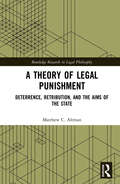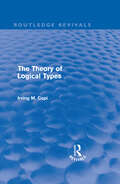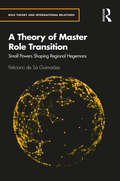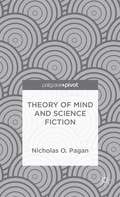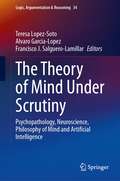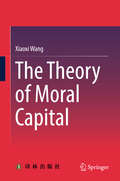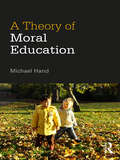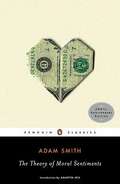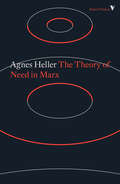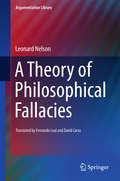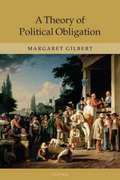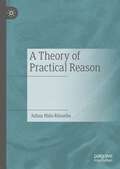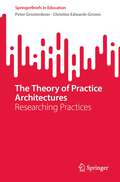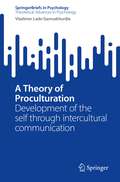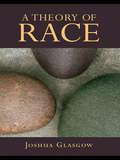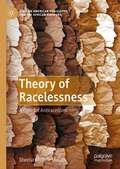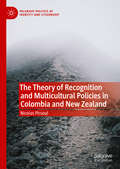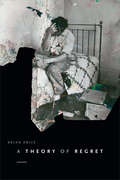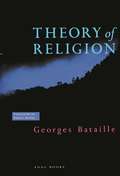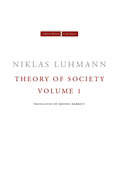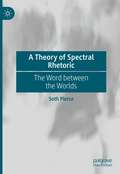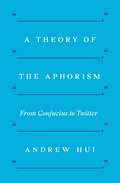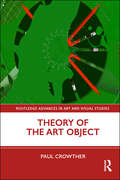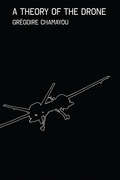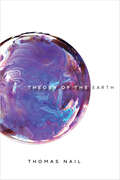- Table View
- List View
A Theory of Legal Punishment: Deterrence, Retribution, and the Aims of the State (Routledge Research in Legal Philosophy)
by Matthew C. AltmanThis book argues for a mixed theory of legal punishment that treats both crime reduction and retribution as important aims of the state. A central question in the philosophy of law is why the state’s punishment of its own citizens is justified. Traditionally, two theories of punishment have dominated the field: consequentialism and retributivism. According to consequentialism, punishment is justified when it maximizes positive outcomes. According to retributivism, criminals should be punished because they deserve it. This book recognizes the strength of both positions. According to the two-tiered model, the institution of punishment and statutory penalties, as set by the legislature, are justified based on their costs and benefits, in terms of deterrence and rehabilitation. The law exists to preserve the public order. Criminal courts, by contrast, determine who is punished and how much based on what offenders deserve. The courts express the community’s collective sense of resentment at being wronged. This book supports the two-tiered model by showing that it accords with our moral intuitions, commonly held (compatibilist) theories of freedom, and assumptions about how the extent of our knowledge affects our obligations. It engages classic and contemporary work in the philosophy of law and explains the theory’s advantages over competing approaches from retributivists and other mixed theorists. The book also defends consequentialism against a longstanding objection that the social sciences give us little guidance regarding which policies to adopt. Drawing on recent criminological research, the two-tiered model can help us to address some of our most pressing social issues, including the death penalty, drug policy, and mass incarceration. This book will be of interest to philosophers, legal scholars, policymakers, and social scientists, especially criminologists, economists, and political scientists.
The Theory of Logical Types: Monographs In Modern Logic (Routledge Revivals)
by Irving M. CopiThis reissue, first published in 1971, provides a brief historical account of the Theory of Logical Types; and describes the problems that gave rise to it, its various different formulations (Simple and Ramified), the difficulties connected with each, and the criticisms that have been directed against it. Professor Copi seeks to make the subject accessible to the non-specialist and yet provide a sufficiently rigorous exposition for the serious student to see exactly what the theory is and how it works.
A Theory of Master Role Transition: Small Powers Shaping Regional Hegemons (Role Theory and International Relations)
by Feliciano de Sá GuimarãesIn this book, Feliciano de Sá Guimarães offers an original application of Role Theory. He proposes a theory of master role transitions to explain how small powers can change regional powers’ master roles without changing the regional material power distribution.Master role transition is the replacement of an active dominant master role by a dormant or inactive role located within one’s role repertoire. Guimarães argues that only a combination of four necessary conditions can produce a full master role transition: asymmetrical material interdependence, altercasting, domestic contestation and regional contestation. In each one of these conditions, a small power uses material and ideational tools to promote a master role transition within the regional power role repertoire. To test his model, Guimarães turns to five case studies in Latin America, Southern Africa and South Asia: the 2006–2007 Bolivia–Brazil gas crisis, the 2008–2009 Paraguay–Brazil Itaipú Dam crisis, the 2008–2009 Ecuador–Brazil Odebrecht crisis, the 1998 South Africa–Lesotho military intervention crisis and the 1996India–Bangladesh Ganges water crisis.A Theory of Master Role Transition is an excellent resource for those studying both theory and method in International Relations and foreign policy analysis.
Theory Of Mind And Science Fiction
by Nicholas O. PaganTheory of Mind and Science Fiction shows how theory of mind provides an exciting 'new' way to think about science fiction and, conversely, how science fiction sheds light not only on theory of mind but also empathy, morality, and the nature of our humanity.
The Theory of Mind Under Scrutiny: Psychopathology, Neuroscience, Philosophy of Mind and Artificial Intelligence (Logic, Argumentation & Reasoning #34)
by Teresa Lopez-Soto Alvaro Garcia-Lopez Francisco J. Salguero-LamillarThis book is a call to expand and diversify our approach to the study of the human mind in relation to the Theory of Mind. It proposes that it is necessary to combine cross-disciplinary methods to arrive at a more complete understanding of how our minds work. Seeking to expand the discussion surrounding the Theory of Mind beyond the field of psychology, and its focus on our capacity to ascribe mental states to other people, this volume collects evidence and research to point to a more holistic understanding of our own minds, the minds of others, behavior, language, and reasoning. This book therefore illuminates the conceptual intricacy underlying the Theory of Mind. It posits that a wide scope is necessary to make a breakthrough in scientific research towards a full understanding of the nature, function, and development of our capacity to converge on biological processes of the brain towards consciousness, emotion, awareness, and cognition. The volume presents methods, results, critiques, and models intended to provoke debates in various academic disciplines. It is of interest to scholars working in psychology, neuroscience, philosophy of mind, and artificial intelligence.
The Theory of Moral Capital
by Xiaoxi WangThis book captures the quintessence of the author’s 20-year career, presenting both unique perspectives and logical arguments. Guided by the Marxist concept of historical materialism, it reveals the function and effect of morality by analyzing and defining the moral domain. Further, it argues that economic development requires moral support by analyzing the inseparable logical connection between economics and morality. Moreover, it investigates moral capital and its route to achieving value multiplication in economic activities, and proposes a practice and evaluation index system for moral capital in enterprises. Combining philosophical analysis and the exploration of practical applications, the book also discusses a basic strategy to help enterprises enrich and manage their moral capital.
A Theory of Moral Education
by Michael HandChildren must be taught morality. They must be taught to recognise the authority of moral standards and to understand what makes them authoritative. But there’s a problem: the content and justification of morality are matters of reasonable disagreement among reasonable people. This makes it hard to see how educators can secure children’s commitment to moral standards without indoctrinating them. In A Theory of Moral Education, Michael Hand tackles this problem head on. He sets out to show that moral education can and should be fully rational. It is true that many moral standards and justificatory theories are controversial, and educators have an obligation to teach these nondirectively, with the aim of enabling children to form their own considered views. But reasonable moral disagreement does not go all the way down: some basic moral standards are robustly justified, and these should be taught directively, with the aim of bringing children to recognise and understand their authority. This is an original and important contribution to the philosophy of moral education, which lays a new theoretical foundation for the urgent practical task of teaching right from wrong.
The Theory of Moral Sentiments: Or, An Essay Towards An Analysis Of The Principles By Which Men Naturally Judge Concerning The Conduct And Character, First Of Their Neighbours, And Afterwards Of Themselves; To Which Is Added A Dissertation On The Origin O
by Adam SmithThe foundation for a general system of morals, this 1749 work is a landmark in the history of moral and political thought. Readers familiar with Adam Smith from The Wealth of Nations will find this earlier book a revelation. Although the author is often misrepresented as a calculating rationalist who advises the pursuit of self-interest in the marketplace, regardless of the human cost, he was also interested in the human capacity for benevolence — as The Theory of Moral Sentiments amply demonstrates. The greatest prudence, Smith suggests, may lie in following economic self-interest in order to secure the basic necessities. This is only the first step, however, toward the much higher goal of achieving a morally virtuous life. Smith elaborates upon a theory of the imagination inspired by the philosophy of David Hume. His reasoning takes Hume's logic a step further by proposing a more sophisticated notion of sympathy, leading to a series of highly original theories involving conscience, moral judgment, and virtue. Smith's legacy consists of his reconstruction of the Enlightenment idea of a moral, or social, science that embraces both political economy and the theory of law and government. His articulate expression of his philosophy continues to inspire and challenge modern readers.
The Theory of Need in Marx (Radical Thinkers)
by Agnes Heller Stephen Bodington Ken CoatesThe first full presentation of a fundamental aspect of Marx, the concept of needWhat are needs? While the edifices of economic theory are built upon various mechanisms designed to satisfy “human needs,” not many economists have addressed the idea of need itself. Heller’s highly original work identifies this lacuna, recognizing the concept of needs as playing a “hidden but principal role in Marx’s economic categories.” Her writing lucidly exposes radical needs as bearing the seeds of revolutionary agency in alienated capitalist society, and reasserts our existence as sentient beings beyond the realm of the material, productive spheres.
A Theory of Philosophical Fallacies (Argumentation Library #26)
by Leonard NelsonPresented as a Vorlesung in the German philosophical tradition, this book presents the most detailed account of Nelson's method of argument analysis, celebrated by many luminaries such as Karl Popper. It was written in 1921 in opposition to the relativistic, subjectivistic and nihilistic tendencies of Nelson's time. The book contains an exposition of a method that is a further development of Kant's transcendental dialectics, followed by an application to the critical analysis of arguments by many famous thinkers, including Bentham, Mill, Poincaré, Leibniz, Hegel, Einstein, Bergson, Rickert, Simmel, Brentano, Stammler, Jellinek, Dingler, and Meinong. The book presents a general theory of philosophical argumentation as seen from the viewpoint of the typical fallacies committed by anybody arguing philosophically, whether professional philosophers or philosophical laypeople. Although the nature of philosophy and philosophical argumentation is one of the most recurrent objects of reflection for philosophers, this book represents the first attempt at a general theory of philosophical fallacy. According to Nelson, it is in the shape of false dilemmas that errors in reasoning always emerge, and false dilemmas are always the result of the same mechanism--the unwitting replacement of one concept for another.
A Theory of Political Obligation: Membership, Commitment, and the Bonds of Society
by Margaret GilbertMargaret Gilbert offers an incisive new approach to a classic problem of political philosophy: when and why should I do what the laws of my country tell me to do? Beginning with carefully argued accounts of social groups in general and political societies in particular, the author argues that in central, standard senses of the relevant terms membership in a political society in and of itself obligates one to support that society's political institutions. The obligations in question are not moral requirements derived from general moral principles, as is often supposed, but a matter of one's participation in a special kind of commitment: joint commitment. An agreement is sufficient but not necessary to generate such a commitment. Gilbert uses the phrase 'plural subject' to refer to all of those who are jointly committed in some way. She therefore labels the theory offered in this book the plural subject theory of political obligation. The author concentrates on the exposition of this theory, carefully explaining how and in what sense joint commitments obligate. She also explores a classic theory of political obligation --- actual contract theory --- according to which one is obligated to conform to the laws of one's country because one agreed to do so. She offers a new interpretation of this theory in light of a theory of plural subject theory of agreements. She argues that actual contract theory has more merit than has been thought, though the more general plural subject theory is to be preferred. She compares and contrasts plural subject theory with identification theory, relationship theory, and the theory of fair play. She brings it to bear on some classic situations of crisis, and, in the concluding chapter, suggests a number of avenues for related empirical and moral inquiry. Clearly and compellingly written, A Theory of Political Obligation will be essential reading for political philosophers and theorists.
A Theory of Practical Reason
by Julian Nida-RümelinIn this book, German philosopher Julian Nida-Rümelin presents a theory of practical reason that is objectivist, or rather realist, as an alternative to the widespread subjectivism in the theory of rationality. This theory has pragmatic traits that can be read as a constructive counterpart to Nida-Rümelin's critique of consequentialism whilst embedding its conception of rationality in the conceptual framework of decision and game theory.
The Theory of Practice Architectures: Researching Practices (SpringerBriefs in Education)
by Peter Grootenboer Christine Edwards-GrovesThis book provides an overview of the Theory of Practice Architectures (TPA), and the associated Theory of Ecology of Practices, in a manner accessible for a broader audience. The authors are part of the authorial team that developed the Theory of Practice Architectures from a strong empirical base, with its initial publication in 'Changing Practices, Changing Education' (Kemmis et al., Springer, 2014). This book follows on from that publication with a singluar focus on the Theory of Practice Architectures, and shows how it can be used as a theoretical framework for a range of empirical research projects. It first outlines and describes both the Theory of Practice Architectures and the Theory of Ecology of Practices, illustrating them with a range of relevant practical examples. Then, it focuses explicitly on designing and undertaking empirical research, analyzing data and reporting findings using the Theory of Practice Architectures. In this way, this book shows specifically and overtly explicate ways that research can be designed, and how data can be collected and analyzed, drawing on the Theory of Practice Architectures as a foundational framework. It also showcases a range of specific examples to allow readers to see the ideas as they have been employed in practice.
A Theory of Proculturation: Development of the self through intercultural communication (SpringerBriefs in Psychology)
by Vladimer Lado GamsakhurdiaIn each connection with new cultural contexts a new hybrid state of cultural adaptation is constructed enabling people to adjust to new conditions by creating innovative solutions for the self. This book aims to provide a brief presentation of innovative cultural psychological theory of proculturation reflecting and oriented on the understanding of semiotic and developmental dynamics of higher mental phenomena while engaging alien signs through intercultural communication. The exploration and theoretical understanding of developmental dynamics (such as self and identity construction) of people who live in immigration or multicultural, or even multi-ethnic societies, the research builds its new focus in contrasts with the acculturation theories currently present in social psychology. The theory of proculturation has been built in opposition to cross-cultural psychological theories as well as mainstream theories of acculturation research dominated by bidimensional theoretical models. Instead, this theory is constructed based on theoretical explorations which are rooted in cultural semiotics and developmental psychological paradigm on human psychology.
A Theory of Race
by Joshua GlasgowSocial commentators have long asked whether racial categories should be conserved or eliminated from our practices, discourse, institutions, and perhaps even private thoughts. In A Theory of Race, Joshua Glasgow argues that this set of choices unnecessarily presents us with too few options. Using both traditional philosophical tools and recent psychological research to investigate folk understandings of race, Glasgow argues that, as ordinarily conceived, race is an illusion. However, our pressing need to speak to and make sense of social life requires that we employ something like racial discourse. These competing pressures, Glasgow maintains, ultimately require us to stop conceptualizing race as something biological, and instead understand it as an entirely social phenomenon.
Theory of Racelessness: A Case for Antirace(ism) (African American Philosophy and the African Diaspora)
by Sheena Michele MasonThis book presents a skeptical eliminativist philosophy of race and the theory of racelessness, a methodological and pedagogical framework for analyzing "race" and racism. It explores the history of skeptical eliminativism and constructionist eliminativism within the history of African American philosophy and literary studies and its consistent connection with movements for civil rights. Sheena M. Mason considers how current anti-racist efforts reflect naturalist conservationist and constructionist reconstructionist philosophies of race that prevent more people from fully confronting the problem of racism, not race, thereby enabling racism to persist. She then offers a three-part solution for how scholars and people aspiring toward anti-racism can avoid unintentionally upholding racism, using literary studies as a case study to show how "race" often translates into racism itself. The theory of racelessness helps more people undo racism by undoing the belief in "race."
The Theory of Recognition and Multicultural Policies in Colombia and New Zealand (Palgrave Politics of Identity and Citizenship Series)
by Nicolas PirsoulThis book analyses the policies of recognition that were developed and implemented to improve the autonomy and socio-economic well-being of Māori in New Zealand and of indigenous and Afro-descendent people in Colombia. It offers a theoretically informed explanation of the reasons why these policies have not yielded the expected results, and offers solutions to mitigate the shortcomings of policies of recognition in both countries. This in-depth analysis enables readers to develop their understanding of the theory of recognition and how it can promote social justice.
A Theory of Regret
by Brian PriceIn A Theory of Regret Brian Price contends that regret is better understood as an important political emotion than as a form of weakness. Price shows how regret allows us to see that our convictions are more often the products of our perceptual habits than the authentic signs of moral courage that we more regularly take them to be. Regret teaches us to give up our expectations of what we think should or might occur in the future, and also the idea that what we think we should do will always be the right thing to do. Understood instead as a mode of thoughtfulness, regret helps us to clarify our will in relation to the decisions we make within institutional forms of existence. Considering regret in relation to emancipatory theories of thinking, Price shows how the unconditionally transformative nature of this emotion helps us become more sensitive to contingency and allows us, in turn, to recognize the steps we can take toward changing the institutions that shape our lives.
Theory Of Religion
by Georges Bataille Robert HurleyTheory of Religion brings to philosophy what Georges Bataille's earlier book The Accursed Share brought to anthropology and history, namely, an analysis based on notions of excess and expenditure. No other work of Bataille's, and perhaps no other work anywhere since Weber's Protestant Ethic and the Spirit of Capitalism, has managed to draw so incisively the links between man's religious and economic activities. <p><p> "Religion," according to Bataille, "is the search for a lost intimacy." In a brilliant and tightly reasoned argument, he proceeds to develop a "general economy" of man's relation to this intimacy: from the seamless immanence of animality to the shattered world of objects and the partial, ritual recovery of the intimate order through the violence of the sacrifice. Bataille then reflects on the archaic festival, in which he sees not only the glorious affirmation of life through destructive consumption but also the seeds of another, more ominous order -- war. <p> Bataille then traces the rise of the modern military order, in which production ceases to be oriented toward the destruction of a surplus and violence is no longer deployed inwardly but is turned to the outside. In these twin developments one can see the origins of modern capitalism.
Theory of Society, Volume 1
by translated by Rhodes Barrett Niklas LuhmannThis first volume of Niklas Luhmann's two-part final work was initially published in German in 1997. The culmination of his thirty-year theoretical project to reconceptualize sociology, it offers a comprehensive description of modern society on a scale not attempted since Talcott Parsons. Beginning with an account of the fluidity of meaning and the accordingly high improbability of successful communication, Luhmann analyzes a range of communicative media, including language, writing, the printing press, and electronic media as well as success media, such as money, power, truth, and love, all of which structure this fluidity and make communication possible. An investigation into the ways in which social systems produce and reproduce themselves, the book asks what gives rise to functionally differentiated social systems, how they evolve, and how social movements, organizations, and patterns of interaction emerge. The advent of the computer and its networks, which trigger potentially far-reaching processes of restructuring, receive particular attention. A concluding chapter on the semantics of modern society's self-description bids farewell to the outdated theoretical approaches of old Europe, that is, to ontological, holistic, ethical, and critical interpretations of society, and argues that concepts such as the nation, the subject, and postmodernity are vastly overrated. In their stead, societyOColong considered a suspicious term by sociologists, one open to all kinds of reificationOCois defined in purely operational terms. It is the always uncertain answer to the question of what comes next in all areas of communication.
A Theory of Spectral Rhetoric: The Word between the Worlds
by Seth PierceThis book synthesizes Jacques Derrida’s hauntology and spectrality with affect theory, in order to create a rhetorical framework analyzing the felt absences and hauntings of written and oral texts. The book opens with a history of hauntology, spectrality, and affect theory and how each of those ideas have been applied. The book then moves into discussing the unique elements of the rhetorical framework known as the rhetorrectional situation. Three case studies taken from the Christian tradition, serve to demonstrate how spectral rhetoric works. The first is fictional, C.S. Lewis ’The Great Divorce. The second is non-fiction, Tim Jennings ’The God Shaped Brain. The final one is taken from homiletics, Bishop Michael Curry’s royal wedding 2018 sermon. After the case studies conclusion offers the reader a summary and ideas future applications for spectral rhetoric.
A Theory of the Aphorism: From Confucius to Twitter
by Andrew HuiAn engaging look at the aphorism, the shortest literary form, across time, languages, and culturesAphorisms—or philosophical short sayings—appear everywhere, from Confucius to Twitter, the Buddha to the Bible, Heraclitus to Nietzsche. Yet despite this ubiquity, the aphorism is the least studied literary form. What are its origins? How did it develop? How do religious or philosophical movements arise from the enigmatic sayings of charismatic leaders? And why do some of our most celebrated modern philosophers use aphoristic fragments to convey their deepest ideas? In A Theory of the Aphorism, Andrew Hui crisscrosses histories and cultures to answer these questions and more.With clarity and precision, Hui demonstrates how aphorisms—ranging from China, Greece, and biblical antiquity to the European Renaissance and nineteenth century—encompass sweeping and urgent programs of thought. Constructed as literary fragments, aphorisms open new lines of inquiry and horizons of interpretation. In this way, aphorisms have functioned as ancestors, allies, or antagonists to grand systems of philosophy.Encompassing literature, philology, and philosophy, the history of the book and the history of reading, A Theory of the Aphorism invites us to reflect anew on what it means to think deeply about this pithiest of literary forms.
Theory of the Art Object (Routledge Advances in Art and Visual Studies)
by Paul CrowtherMeaning in the visual arts centers on how the physical work makes its content or presence visible. The art object is fundamental. Indeed, the different object forms of each visual medium allows our experience of space-time, and our relations to other people, to be aesthetically embodied in unique ways. Through these embodiments, visual art compensates for what is otherwise existentially lost, and becomes part of what makes life worth living. The present book shows this by discussing a range of visual art forms, namely pictorial representation, abstraction, sculpture and assemblage works, land art, architecture, photography, and varieties of digital art.
A Theory of the Drone
by Grégoire ChamayouDrone warfare has raised profound ethical and constitutional questions both in the halls of Congress and among the U.S. public. Not since debates over nuclear warfare has American military strategy been the subject of discussion in living rooms, classrooms, and houses of worship. Yet as this groundbreaking new work shows, the full implications of drones have barely been addressed in the recent media storm.In a unique take on a subject that has grabbed headlines and is consuming billions of taxpayer dollars each year, philosopher Grégoire Chamayou applies the lens of philosophy to our understanding of how drones are changing our world. For the first time in history, a state has claimed the right to wage war across a mobile battlefield that potentially spans the globe. Remote-control flying weapons, he argues, take us well beyond even George W. Bush's justification for the war on terror.What we are seeing is a fundamental transformation of the laws of war that have defined military conflict as between combatants. As more and more drones are launched into battle, war now has the potential to transform into a realm of secretive, targeted assassinations of individuals--beyond the view and control not only of potential enemies but also of citizens of democracies themselves. Far more than a simple technology, Chamayou shows, drones are profoundly influencing what it means for a democracy to wage war. A Theory of the Drone will be essential reading for all who care about this important question.
Theory of the Earth
by Thomas NailWe need a new philosophy of the earth. Geological time used to refer to slow and gradual processes, but today we are watching land sink into the sea and forests transform into deserts. We can even see the creation of new geological strata made of plastic, chicken bones, and other waste that could remain in the fossil record for millennia or longer. Crafting a philosophy of geology that rewrites natural and human history from the broader perspective of movement, Thomas Nail provides a new materialist, kinetic ethics of the earth that speaks to this moment. Climate change and other ecological disruptions challenge us to reconsider the deep history of minerals, atmosphere, plants, and animals and to take a more process-oriented perspective that sees humanity as part of the larger cosmic and terrestrial drama of mobility and flow. Building on his earlier work on the philosophy of movement, Nail argues that we should shift our biocentric emphasis from conservation to expenditure, flux, and planetary diversity. Theory of the Earth urges us to rethink our ethical relationship to one another, the planet, and the cosmos at large.
